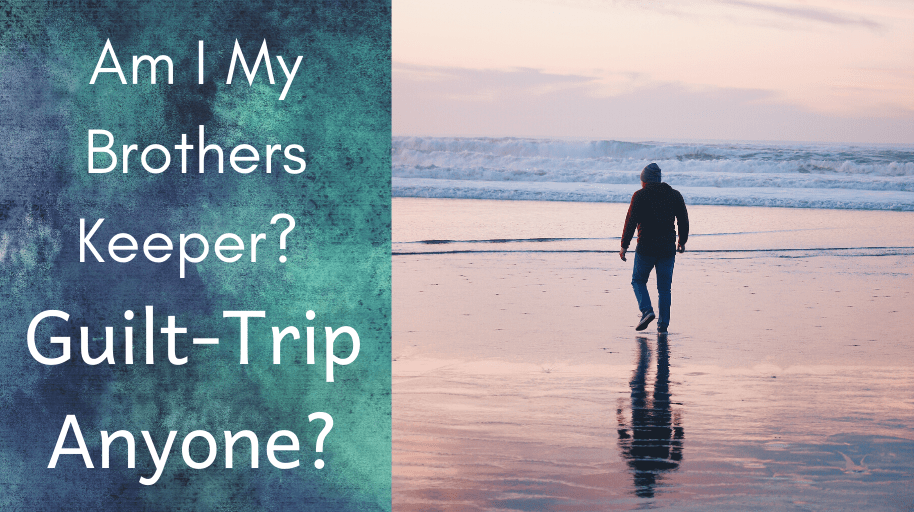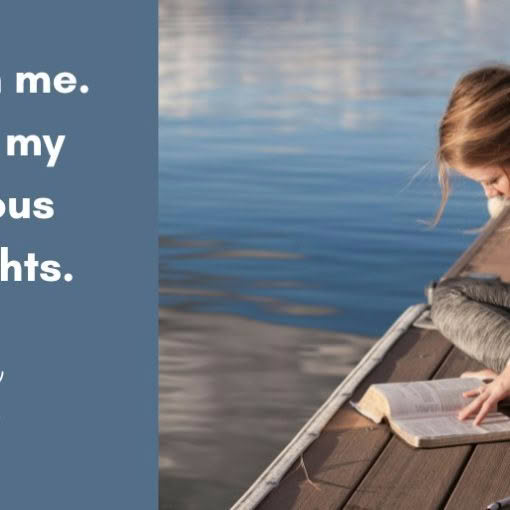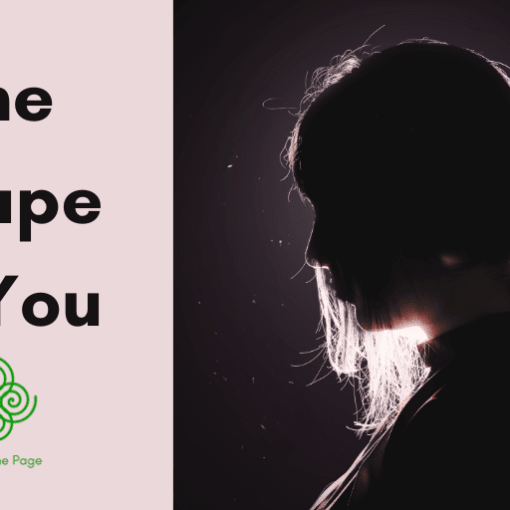It was the feelings of a guilt trip and the words of being a ‘Brothers Keeper’ that triggered me. But was it genuinely helping me and them to think this way? Something needed to change.
Some people seem to be able to push the manipulation guilt trip button every time. They tell you how life has been hard. They share their background and a wide range of struggles. You listen, and you empathize with their struggle, and indeed life is hard for some people.
Then you look at yourself and all that you have. You may begin to feel some guilt, then some sense of a need to help them. You want to help, but you have only so much life, energy, time, and money.
In the Bible, there is a story, or in particular, a phrase from that story, that can kick into gear and hit the guilt-trip button.
My Brothers Keeper
It is the story of the first murder and an attempt to deflect blame.
It comes right from the story of Cain killing Abel in the first book of the Bible – Genesis.
Two brothers, Cain and Abel, bring gifts to God. Abel’s gift was accepted because he did what was right. Cain does not do what was right, and so it was rejected. Cain was furious, and God could see that he was angry. That is where we pick up the story.
The Lord said to Cain, “Why are you angry, and why has your countenance [facial expression] fallen? If you do well, will you not be accepted? And if you do not do well, sin is lurking at the door; its desire is for you, but you must master it.”
Cain said to his brother Abel, “Let us go out to the field.” And when they were in the field, Cain rose up against his brother Abel, and killed him.
Then the Lord said to Cain, “Where is your brother Abel?” He said, “I do not know; am I my brother’s keeper?” And the Lord said, “What have you done? Listen; your brother’s blood is crying out to me from the ground! Genesis 4:6-10
Before we go any further, the word ‘keeper’ comes from the Hebrew word ‘Shomer’ which means ‘keeper,’ ‘guardian,’ and ‘watcher.’
At first glance, Cain wanted to avoid the issue. He knew exactly where Abel was. Avoid and hide by saying a lie. We all do it to see if we can get away with our murders.
Then he says, ‘Am I my brother’s keeper?’ asking if he is the one that is meant to know where his brother is located. He is essentially saying, ‘How would I know that? There is no GPS tracker attached to him.’
God is offering an opportunity for Cain to come clean and confess to what he has done.
Instead, Cain tries to shift responsibility away from himself for what he had done and to put it on to God. Its a manipulation, an attempt to guilt-trip God.
Essentially he is saying ‘God, you knew I was angry and you did nothing about it. Arent you, God, the keeper, guardian, and watcher of Abel? You could have stopped all this. So don’t blame me. I can’t be held responsible for my actions.’
The point is that God could see Cain’s heart and the murderous anger within him. God warned him of it and Cain’s personal responsibility to master it. Cain chose to ignore God’s counsel.
Life is hard, and it’s easy to blame others and God for our difficulties, some of which may be quite valid.
But then we turn around and expect others, including God, to fix life, without any acceptance of our human failings and personal responsibilities. We project onto others our anger, pain, resentment, and try to guilt-trip manipulate them, including God, into making things better. It’s all about us.
We want God and others to do for us what we are expected to do for ourselves.
The ‘Yes’ and ‘No’ of being a brother or sister keeper
This little story tells us a lot about responsibility and where it starts and finishes.
The ‘Yes’
I believe that to some degree, I am to have a caring, loving, and keeping relationship with others. When I see injustices, I need to respond. I am called to care for others and help them. I am, in a sense, to be like God in this instance where he warned Cain of what he could see could happen. I also need to make sure they know they are responsible to ‘master’ their own life.
As a father, I took full responsibility for my children when they were little. I was their keeper, guardian, and I watched over everything about them. As they got older, I passed over more of the responsibility to them. I gave them advice and let them make choices and accept the responsibility for the decisions they made. I didn’t rescue them, but they knew I was there for them.
The ‘No’
I am not my brothers or sisters keeper in the sense that I will not take responsibility for the choices they made. I am not going to cross the line where I do for others what they could and should be doing for themselves. God didn’t intervene with Cain because Cain had freedom of choice. God does not have puppet strings ‘coming down from heaven’ connected to our movements.
Is someone ‘shoulding’ on you?
I’ve heard and seen it many times. Those words of ‘We should be doing more for them’.
The words may be voiced verbally, or they could be internal whispers that have a tinge of obligation, guilt shadowing around them.
I remember two women who used to come to our Tuesday night service. Well, actually, they only ever came when we had a meal. Primarily they only came for what they could get. When I asked them if they could help wash some dishes, there was always some excuse that they couldn’t help. Great stories of struggle were told. There was an attitude that it was everyone else’s responsibility to look after them.
I would sense them trying to guilt-trip me, and they were masters at it. They had people running around after them doing all sorts of things. They had never really grown up. There was a dependency lifestyle, and they were milking it for all its worth. It was idleness instead of industry.
Whenever I sense this feeling of being guilt-tripped by a P.L.O.M. (Poor Little Old Me), I go to one question.
‘What are you doing about this?
I shift the responsibility back on to them. It’s like what God did with Cain when he said, ‘you must master it’.
I get very pragmatic and practical. I don’t rescue. Rescuing teaches nobody anything and only breeds resentment, tiredness, and fatigue in yourself and dependency on others.
Anyone unwilling to work should not eat.
It may seem harsh, but I think there are too many people in society that are getting too much for doing too little. Sure, there are always exceptions to the rule, but I have met too many people who draw a government benefit, etc. that do nothing to make things better for themselves or others.
I know that not everyone is capable of maintaining a full-time job or even find one, but it’s the attitudes and belief systems of entitlement and dependency on others that annoy me.
Contrast that with the attitude of Paul
For you yourselves know how you ought to imitate us; we were not idle when we were with you, and we did not eat anyone’s bread without paying for it; but with toil and labor we worked night and day, so that we might not burden any of you. This was not because we do not have that right, but in order to give you an example to imitate. For even when we were with you, we gave you this command: Anyone unwilling to work should not eat. 2 Thessalonians 3:7-10
In Mental Health, it could be facing your fears and going to see a doctor about your depression or anxiety. It could be taking that next millimeter step in recovery and asking for help to master the struggles to be self-responsible. You might need to learn how to say ‘No’ to the manipulations and guilt-trips projected on to you.
When you have the feelings of a guilt trip being loaded on you, and you hear the words of being a ‘Brothers Keeper’, ask yourself this. By helping them, is it genuinely helping them?
Mental Health is … not caving into guilt-trips and being a ‘brother’s keeper’. It’s teaching and modeling self -responsibility.
Quotes to consider
- Your future is not determined by your past or your parentage, but by your own choices-the the choices you make today and tomorrow. Now is the key to tomorrow, not yesterday. D. Riddell
- We cannot excuse our sinful responses to others on the grounds of their mistreatment of us. We are responsible for what we do. Larry Crabb
- Learn to respond to others with honest, open questions instead of counsel or corrections. With such questions, we help “hear each other into deeper speech.” Parker J. Palmer.
Questions to answer
- What happens in you when you sense you are being ‘guilt-tripped’?
- What is mentally healthier? To expect/ demand God to make life better for us, or to ask God to help us to discover God and to ‘master’ the struggles.
- How do you learn to be pragmatic in the face of emotional manipulation?
Further reading
- Please. No Fixing, Advising, Saving or Straightening Out
-
7 Steps to Help Those with P.L.O.M’s (Poor Little Old Me) in the Mouth
Barry Pearman
Photo by Nong Vang on Unsplash





